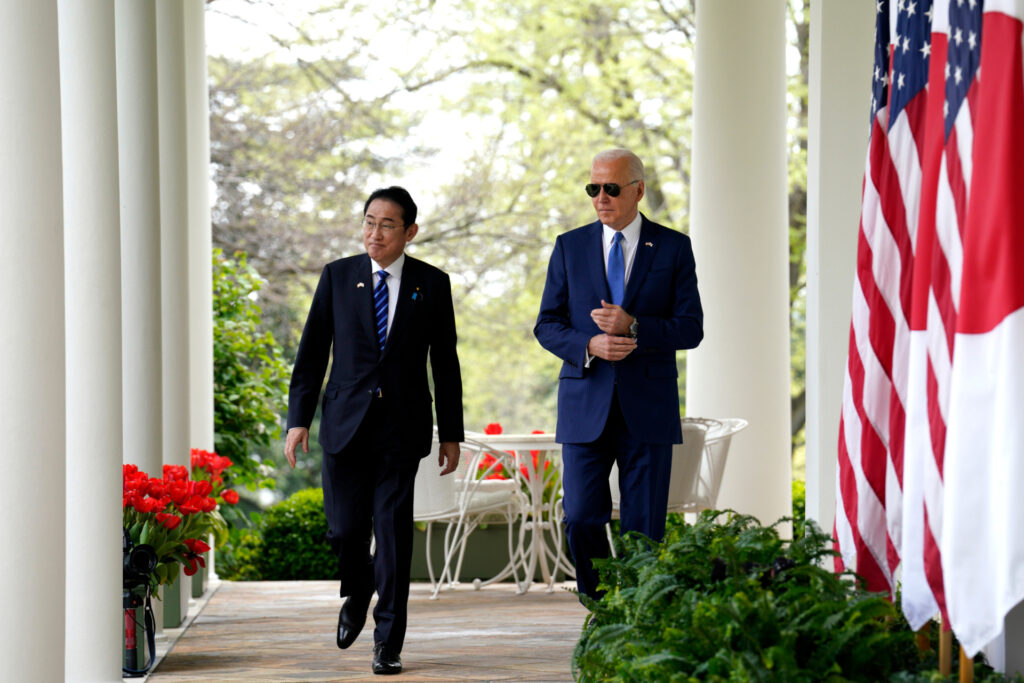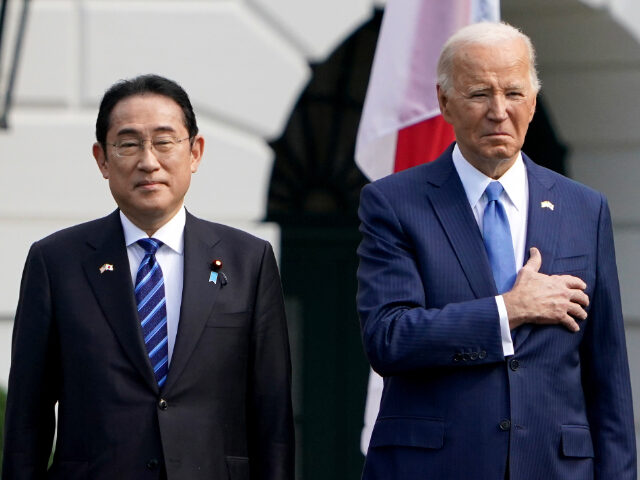Japanese Prime Minister Kishida Fumio visited the White House on Wednesday for a summit meeting with President Joe Biden.
The growing Chinese security threat to Pacific nations was a major topic of conversation, but the two leaders discussed various economic and technology issues as well, including the rapidly growing and unnerving field of artificial intelligence (AI).
The Associated Press (AP) archly noted that Kishida and Biden are in comparably dire political straits, as both are struggling with low approval ratings, corruption scandals, and severe economic problems. Both of them were therefore eager to play up the close relationship between Japan and the United States to generate some positive headlines.

Japanse Prime Minister Kishida Fumio and U.S. President Joe Biden arrive for a news conference during a state visit in the Rose Garden of the White House in Washington, DC, on April 10, 2024. (Yuri Gripas/Abaca/Bloomberg via Getty Images)
“I am hopeful that 2024 will be the year for the Japanese economy to break free from the deflationary sentiment and cost-cutting, scaling-down mentality that has weighed heavily on our nation,” Kishida said during a visit to the U.S. Chamber of Commerce on Tuesday before heading to the White House.
To that end, Kishida met with Microsoft President Brad Smith to celebrate Microsoft’s $3 billion investment in two Japanese data centers and a new AI laboratory. The lab is scheduled to train three million AI workers by 2027. Among their duties will be helping the Japanese government to improve its cybersecurity defenses.
“These investments aim to support Japan’s key pillar to tackle deflation and stimulate the economy by expanding the infrastructure, skilled talent, and security required to accelerate Japan’s digital transformation and adoption of AI,” Microsoft said in its statement on Kishida’s meeting with Smith.
“This significant enhancement in digital capacity will enable Microsoft to provide more advanced computing resources in Japan, including the latest graphics processing units (GPUs), which are crucial for speeding up AI workloads,” the company added.
Microsoft said its Japanese investment was part of the company’s drive to “increase its hyperscale cloud computing and AI infrastructure.”
As the name implies, a hyperscale cloud system is a massive online data storage and processing resource that incorporates numerous widely distributed data centers to create what customers perceive as one big, fuzzy, friendly cloud of services.
True hyperscale cloud computing is still in its infancy, and networks on that immense scale are difficult to build and maintain. The big three providers — Microsoft, Amazon, and Google — currently control about 65 percent of the cloud market, with the rest divided between smaller regional providers.
As for the new AI lab in Japan, Microsoft said it would focus on “areas including embodied AI and robotics, societal AI and wellbeing, and scientific discovery that align with Japan’s socio-economic priorities.”
This seems like an oblique reference to Japan’s 2019 Social Principles of Human-Centric AI, a document that said artificial intelligence should be designed in a way that actively promotes “human dignity, diversity, and sustainability.” In practice, this has boiled down to a strong emphasis on transparency in how AI systems manipulate the data seen by human users with search algorithms and a higher degree of legal liability for AI providers whose systems cause problems for human users.
Microsoft said that in addition to building its AI laboratory and training complex, it would contribute $10 million in grants over the next five years to the University of Tokyo and the Partnership on Artificial Intelligence Research, a joint project of Keio University and Carnegie Mellon University.
“We are honored to contribute to Japan and its future with our largest investment to date, technology and knowledge,” Microsoft President Miki Tsusaka said after meeting with Kishida. “In collaboration with our partners, Microsoft Japan is fully committed to supporting the people and organizations of Japan to solve social problems and achieve more.”
White House officials said on Wednesday that Amazon and electronics giant Nvidia would contribute to a $50 million joint AI research program between the University of Washington in Seattle and Tokyo’s Tsukuba University, in addition to the Carnegie Mellon-Keio University joint project.
Some of the enthusiasm for these projects appears to stem from the Biden administration’s desire to formulate a new set of AI regulations before the end of Biden’s term. The White House recently set a year-end deadline for federal agencies to develop strategies for monitoring the impact of AI technology.
Nikkei Asia reported on Tuesday that Japanese Education Minister Moriyama Masahito will “soon” visit the U.S. for meetings with U.S. Deputy Secretary of Energy David Turk, during which they will sign the first U.S.-Japan bilateral agreement on artificial intelligence technology. The two just had a meeting in Washington on Tuesday to discuss research into nuclear fusion energy.
Both Moriyama and Turk’s agencies have ongoing projects to study how generative AI can be employed to enhance scientific research. At the very least, AI systems could handle routine paperwork and help researchers collaborate more efficiently, but there are hopes that advanced AI might be able to design experiments and develop hypotheses by digesting huge amounts of experimental data.
The bilateral agreement to be signed by Moriyama and Turk will include the sharing of research data, exchanges of students and scientists between the two countries, and even collaboration between two named supercomputers, Japan’s Fugaku and America’s Aurora.
The Aurora supercomputer, sponsored by the Department of Energy and built by the Intel and Cray corporations, is located at the Argonne National Laboratory in Lemont, Illinois. It is currently rated as the second-fastest supercomputer in the world, trailing behind only the Cray-built Frontier system at the Oak Ridge National Laboratory in Tennessee, but Aurora is undergoing some upgrades that will probably allow it to take the number one spot. Fugaku is presently considered the fourth-fastest supercomputer in the world.
Closer cooperation with the U.S. on AI and supercomputers could be part of Japan’s bid to join the AUKUS defensive alliance, formed in 2021 by the United States, United Kingdom, and Australia.
AUKUS issued a joint statement on Monday commending the work of “like-minded partners” on developing quantum computer technology for cybersecurity and electronic warfare.” The statement mentioned only one of those partners by name: Japan.
“Recognizing Japan’s strengths and its close bilateral defense partnerships with all three countries, we are considering cooperation with Japan on AUKUS Pillar II advanced capability projects,” the statement said. Pillar II is the AUKUS commitment to developing advanced computer capabilities, while Pillar I is ensuring freedom of navigation in the Asia-Pacific region in the face of China’s territorial ambitions.

COMMENTS
Please let us know if you're having issues with commenting.